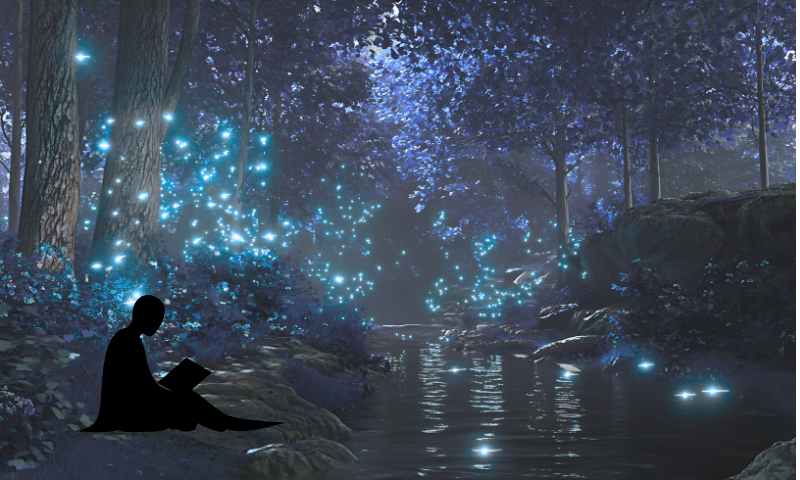
Spring
Welcome to May in Nova Scotia, home of Dragonfly.eco, a website and news source for all things eco-fiction. My dear friends, we have finally started to experience spring. Our winters go longer than most, but the fruit trees are in full bloom in the meadow and we’ve started the hard work of re-landscaping our garden area. But, most importantly, like Margaret Wise Brown once wrote:
When the groundhog casts his shadow
And the small birds sing
And the pussywillows happen
And the sun shines warm
And when the peepers peep
Then it is Spring
The peepers sing in the evenings just as the black flies retreat to their nightly foliage. I love to sit on the balcony at twilight, after the flies go rest, and listen to the thumb-sized chorus frogs at the nearby lake. The sound of peepers is pure paradise, with clear, dark skies above soon revealing stars, constellations, and asterisms.
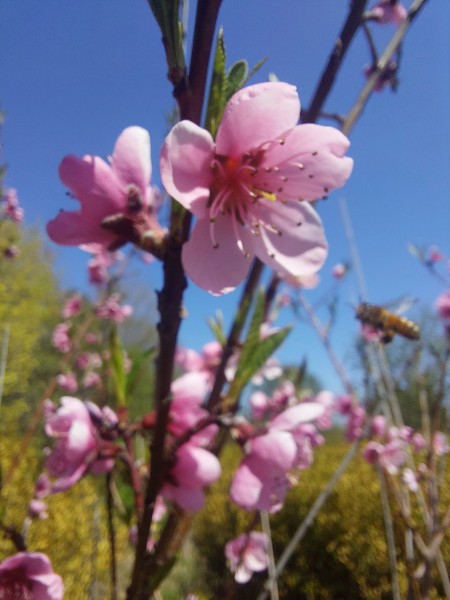
This weekend the black flies are out in full force, but in a week or two they will be gone until next spring. Yesterday it was 30C, hot but windy, and I spent hours outside planting herbs and geraniums, and then fully cleaned our car inside and out. The geraniums are for stunning the invasive Japanese beetles—who like their leaves—and keeping them off the bean and tomato leaves. Even though I drank a lot of water, I got dehydrated. Today we erected two 3-foot high garden beds after my partner borrowed a friend’s tractor and spread gravel and then cement slabs in our fenced garden area. The black flies landed with audible plops and buzzed around our hat nets. Hopefully, we can get the other bed built tomorrow and filled with dirt. After the gardens are done this long holiday weekend, we’ll spend future weekends kayaking the many lakes surrounding us.
Maybe you understand my love for the outdoors, but it also extends to literature addressing our world’s ecological wonders and, alas, losses.
World ecofiction series
This month I talk with award-winning author Cristina Jurado, who wrote the brilliant novella ChloroPhilia, out in English for the first time (translated by Sue Burke) by Apex Book Company. Inspired by her homeland in Spain and the malls and sandstorms of UAE, Cristina imagined a future climate-changing world where people live in cloisters to protect them from harsh wind-sand storms. One boy, Kirmen, undergoes experiments from a doctor to survive the drastic life outside. He becomes a human-plant hybrid, so the novella is about body horror as well.
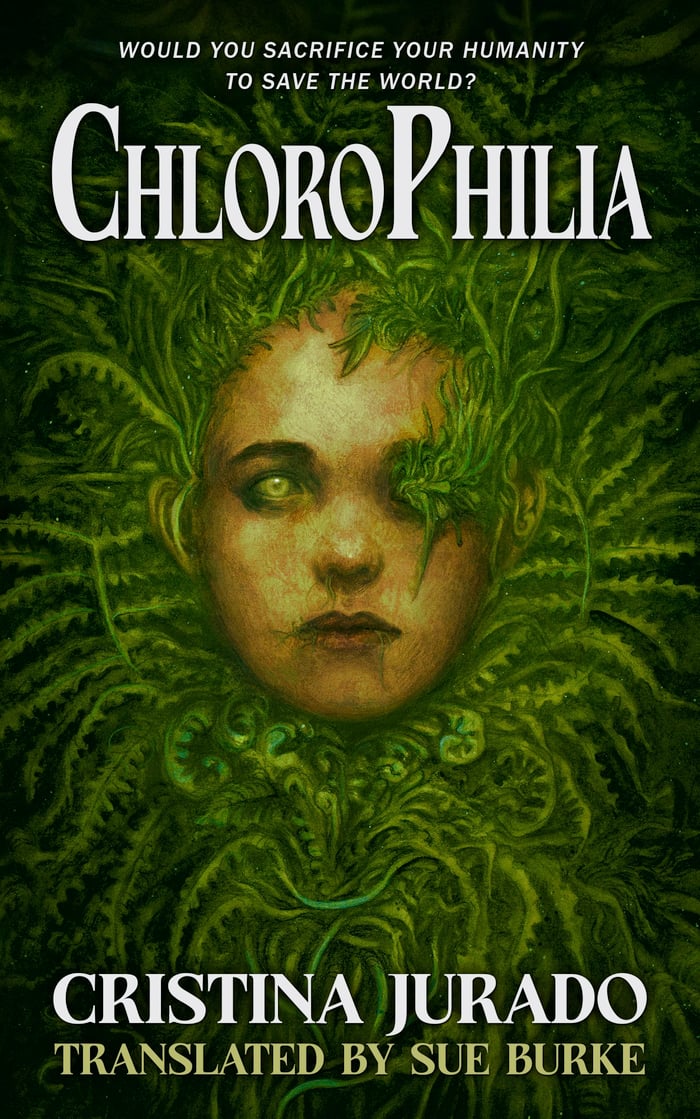
Film of the month
I recently watched 2073, directed by Asif Kapadia. Having run this site for nearly 12 years, I’ve seen and read all kinds of climate and ecological fiction. I’ve also sat on several panels, where the audience asks questions. I’m left with the fact that while the movie isn’t hopeful or particularly wonderful, it gives insight into why the world is where it is now and why it might be heading to further dystopia and apocalypse. Scenes of the worst climate and political events fill the movie, which I feel is somewhat of a lazy trope because it instills fear and powerlessness. Not only that, but the attempt at showing even worst scenes in the future—well, it’s already happening. We’re there now. One of the questions readers always ask on panels is, “Why is this fiction so bleak? I don’t want to read it or see it. I want to find something more hopeful.” Well, there’s plenty of courageous characters in ecofiction, and lots of positive forces, but a shelf of such fiction would be intermixed with fearful cautionary tales, like 2073, so you have to pick and choose.
2073 is a dystopian docufiction about a woman living in that year telling her story while she looks back on media left by her grandmother. The flashbacks are taken from actual footage from real people: politicians, reporters, corporate billionaires. The timeline in 2073 is bleak, scary, and believable; like I mentioned, it is already happening in places. The film shows no positive outcomes; the only thing that comes close is the main character’s brief aftermath of reflection: “Could I have done anything? Changed anything?” I think the answer to that is yes, but we have to vote, fight misinformation, and not support corporations whose owners financially pay for dictators that care only about money and control, not about human justice and a healthier environment. In fiction, though, we also have to imagine better worlds. That’s what empowers readers. Without that blueprint and knowledge that others are on the same mission and we aren’t alone, it is easy to fall into despair.
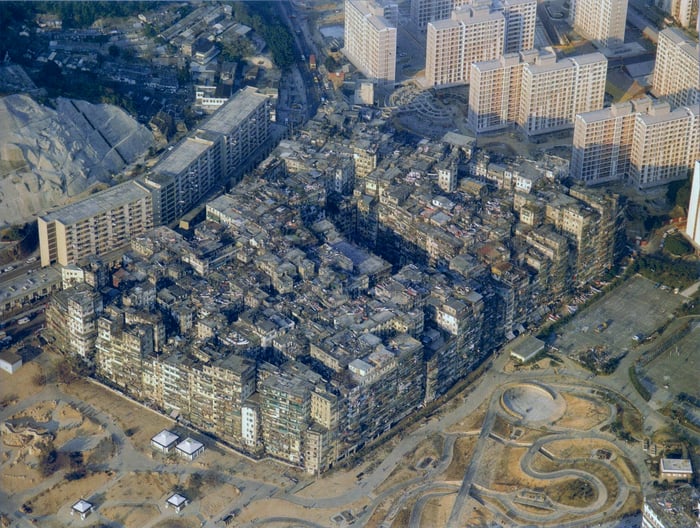
Flashback
Related to writing about climate change without being purely frightful, and, in fact, looking at the everyday human side of life in a more positive light, I began writing my own climate novel back in 2007 or so. It went through a few versions, and even the first edition changed slightly when I decided to add another book to what turned out to be a duology. The first book was Back to the Garden, first published by Moon Willow Press and then by Dragonfly Publishing. I wrote the series under the nom de plume Clara Hume.
Back to the Garden is told from the perspective of a group of “tipping point” survivors—a generation of mountain folks who have experienced the collapse of late-stage capitalism, along with widespread ecosystem degradation due to climate change. While the friends and family in this novel struggle to survive and overcome personal losses and grief, they do so with the strength of character that allows people to gracefully succeed during times of societal failure. They understand that true riches of life come from healthy ecosystems and from their relationships with each other. They learn to survive and adapt in a climate-changed world. Part road novel, part survival tale, and part romance, this literary novel looks into the human psyche as people similar to how we imagine ourselves find hope in the face of disaster.
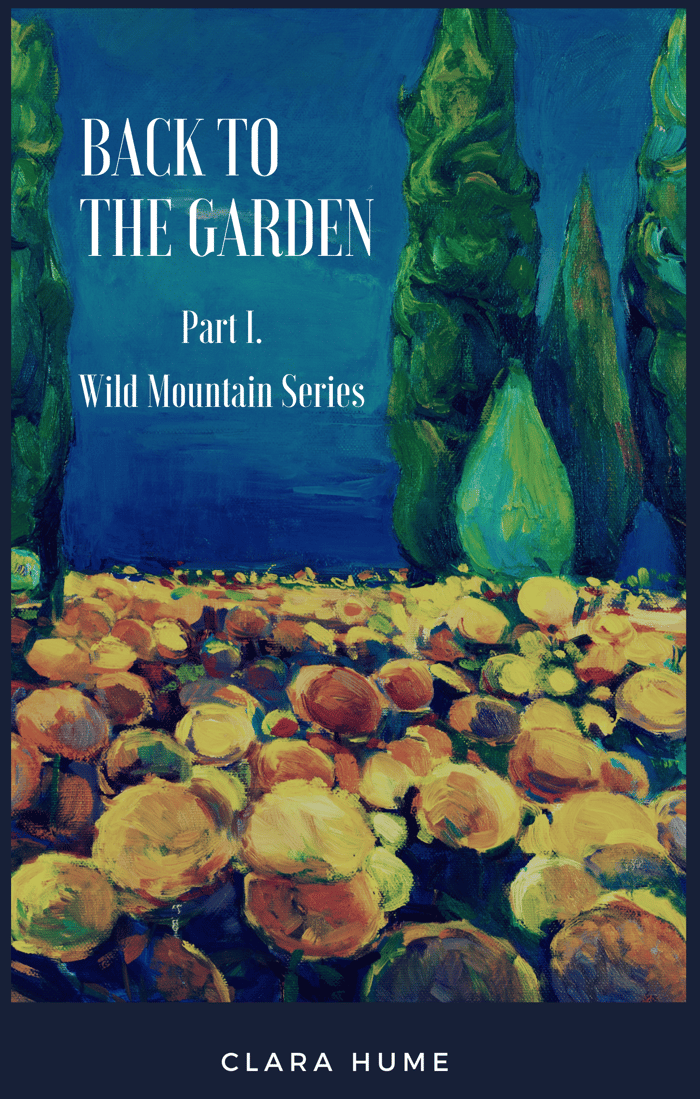
One reviewer said, “One of the best post apocalypse books ever. A road novel with heart. Although many tragic scenes are described, there is no gratuitous lingering on the violence that plagues the world.”
Read the book ordering page for more reviews. The second book in the series is The Stolen Child, inspired by WB Yeats’ poem.
Resources
In case you’ve missed these exciting resources, including newest books at Dragonfly.eco, check ‘em out!
LinkTree: Find out more about me.
Dragonfly Publishing: My own micro-press.
Rewilding Our Stories: A Discord community where you can find resources, reading, and writing fun in fiction that relates strongly to nature and environment.
I finally created a new playlist of “Nature, climate, and environmental songs”. Click here for part 1 (very long!) and here for the new part 2.
Book recommendations: a growing list of recs.
Eco/climate genres: They’re all over the place, and here’s an expanding compendium.
Inspiring and informative author quotes from Dragonfly’s interviews.
List of ecologically focused games.
List of eco/climate films and documentaries.
Eco-fiction links and resources.
Book database: Database of over 1,100 book posts at Dragonfly.eco.
Turning the Tide: The Youngest Generation: Fiction aimed toward children, teens, and young adults.
Indie Corner: The occasional highlight of authors who publish independently.
Artists & Climate Change. This site is no longer being updated but still has a wealth of info. I was a core writer for their team, and I’m both honored and grateful. Look for my “Wild Authors” series there.
You just read issue #54 of Dragonfly.eco News. You can also browse the full archives of this newsletter.
